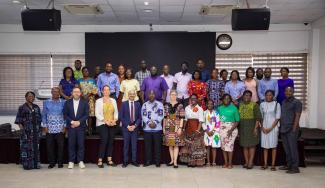
The President of the German Academic Exchange Service (DAAD), Professor Joybrato Mukherjee, has reaffirmed the importance of academic collaboration between Germany and Africa during a visit to the West Africa Centre for Crop Improvement (WACCI) at the University of Ghana.
Accompanied by three officials, Prof. Mukherjee toured the Centre, praised its achievements and engaged in discussions about future opportunities for academic and research funding.
WACCI’s Founding Director, Professor Eric Danquah, outlined the Centre’s 17-year journey, highlighting its impact on crop science research and the training of plant breeders across Africa. He emphasised the strategic importance of Agriculture to Africa’s development.
‘‘Our vision has been to train a new generation of Crop Scientists for a climate-resilient Africa," Prof. Danquah stated.

Professor Eric Danquah
Prof. Danquah also presented WACCI’s "Strategic Asks" to DAAD, including the establishment of a flagship African-German programme on new breeding tools, the elevation of WACCI into a continental Centre of Excellence and scaling the Kofi Annan Enterprise Hub into a pan-African youth agro-innovation network.
Importantly, he introduced the concept of WACCI 3.0, describing it as a transformative new phase focused on deepening partnerships, accelerating technology adoption and ensuring that innovations in crop science translate into tangible benefits for African farmers. WACCI 3.0 seeks to place the Centre at the forefront of global agricultural research and entrepreneurship, empowering Africa’s next generation of scientists and innovators.
Congratulating the Centre for its achievements, Prof. Mukherjee described WACCI’s exploits as a testimony to its global relevance in plant sciences and crop production.
"It is in our joint interest that this success story goes on," Prof. Mukherjee said. "While I cannot personally promise grants, I am committed to working together to think strategically about the next phase of WACCI’s development."

Professor Joybrato Mukherjee
He further emphasised the importance of presenting strong arguments that underline mutual benefits for both Africa and Germany, especially amid ongoing discussions in Germany about the future direction of international cooperation and development partnerships.
The discussions during the visit also underscored the significance of promoting inclusive, accessible opportunities for research and innovation.
Gudrun Chazotte, Head of Section for Scholarship Programmes at DAAD, encouraged WACCI students to take advantage of various scholarship opportunities available in Germany.
“We have bi-national Ph.D. programmes, where students can spend up to two years in Germany while completing their PhD," she said. "We also offer fully funded PhD scholarships and short-term research grants. It’s competitive, but you have shown you are well-prepared at this Centre. I would love to see more of your high-flyers in German institutions. Please use the opportunities you have and apply.”
Lena Leumer, DAAD Regional Office Director in Ghana, added that new funding avenues are also emerging within Africa.
"From next year, under the Horizon Europe initiative, there will be a new programme called Study and Research in Africa, which will focus on scholarships within the continent," she revealed." She further echoed the importance of reframing the narrative when engaging donors, noting that many graduates from WACCI now occupy high-skilled positions in Europe.

Ms. Lena Leumer
"This doesn't necessarily fit the traditional development narrative, but it aligns with the growing global need for skilled workers. There are benefits on both sides, Africa and Europe and it’s important to present this as a win-win situation," she emphasised.
Their remarks reflected a shared understanding that agricultural innovation, academic mobility and development cooperation must all be designed with inclusion, diversity and mutual benefit in mind.
The visit concluded with a commitment to chart a collaborative roadmap involving DAAD’s regional office in Accra and other stakeholders, aimed at advancing WACCI’s goals and expanding research and training opportunities for African Scientists.

The visit aligns with the University’s Strategic Priority 4 ‘Engagement and Partnerships.
Established in 2007 with initial funding from the Alliance for a Green Revolution in Africa (AGRA), WACCI has evolved into a hub for research and training, attracting over $100 million in funding for agricultural development across West and Central Africa. The Centre offers innovative programmes such as a PhD in Plant Breeding and an MPhil in Seed Science and Technology.The Centre has released over 270 crop varieties across ten African countries.
